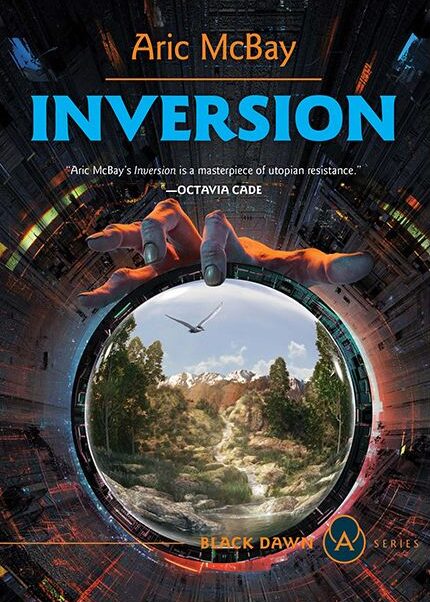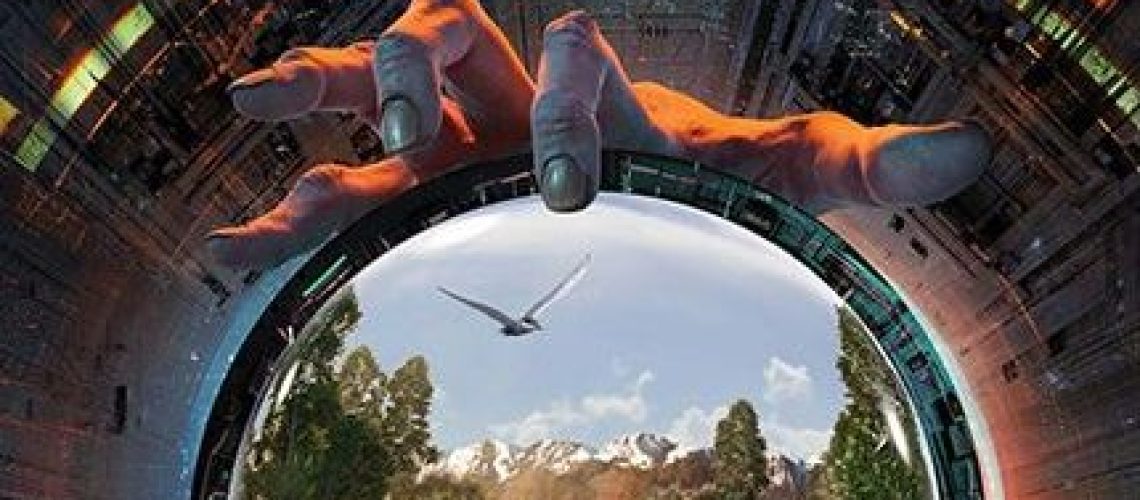The Black Dawn fiction series from AK Press has another fascinating new speculative fiction novel that fits within its mission of honoring anarchist traditions and the work of Octavia Butler. I formerly had the opportunity to review adrienne maree brown’s Grievers, the debut title for the series that is set in the near future. Aric McBay’s Inversion would be classified more within the realm of space opera, being set in a pocket universe colonized by humans fleeing oppression. Though relatively slim compared to most space operas at only 240 small-sized pages, Inversion packs a narrative punch along with rich world building and engaging thematic threads of ecology, collectivism, and resistant to militaristic colonization.

Char and her family are among the nomadic Summer people of Germinal who tend to the rich biodiversity of their world through reciprocity and ritual. They must forever travel to stay ahead of the walls of fire that approach like clockwork, bringing with them both loss and renewal. The flamewalls divide their world into three seasons and three ways of life, keeping them from the Spring and Winter people, about whom they must never ask. Char is the first to spot the off-world landing vessels bearing the militaristic invaders whose intentions are far beyond her worldview.
Graft is a captive servitor and personal attendant to the Conquis, leader of the vanguard forces. The last survivor of a culture annihilated by conquest, Graft is tortured by grief and determined to avoid notice, but he soon recognizes how unprepared Char and her people are to deal with the invasion.
I hesitate to even say as much as I already have about the plot of Inversion, and though I usually summarize stories in my own words, I’m defaulting to a portion of the official blurb that I read before I started the novel. McBay masterfully gives us little bits to establish the future non-terrestrial setting of Germinal and its human characters. At least, Char and her “family” seem human. Yet, things also seem to be non-standard to the reality we know, such as this flamewall, and the “stars” that appear in the “skies” above them. Gradually, the workings and logic of this world begin to make sense, along with their connections to the history of Germinal’s origin and what has brought the invasionary forces there.
The novel is split between the two very different points of view of Char and Graft. Knowing only the culture and reality of Germinal, Char faces challenges in first contact with hostile forces, particularly from being unaccustomed to hostility of such a high degree. Graft represents the viewpoint of the previously conquered and colonized, a person who has been driven into submission and given up hope at any existence beyond serving the Conquis. However, Graft is more than he seems at first. Graft’s point of view is particularly interesting as it is written in the first person plural of “we.” While he exists as an individual biological entity, technology from his now otherwise obliterated culture permits him to share his mind with the collective memories of his people. And they haven’t yet given up hope, or the fight.
The villains of this novel are led by the almost cartoonishly evil Conquis, a man whose view of the universe couldn’t be more different from that of those on Germinal:
In front of us, the sun was sinking slowly into the circular ocean at the pole of the world, sliding into a whirling vortex of waves a dozen kilometers across. We could hear a distant, uneven rumble, like a ship’s engine throttling down.
Beneath the sound, the Conquis muttered to himself. “The purpose of man is to shape nature,” he said softly, as if repeating a mantra. “When nature shapes man, he ceases to be human.“
The question of what it means to be human, and how that fits into the broader ecology, is a recurrent thread in Inversion. The culture of Germinal clearly sees themselves as part of the ecology and as shaped by the environment. I therefore found it surprising how the novel also repeatedly seeks to set the humans apart from the rest of biology, particularly in declaring that humans are not animals:
“We don’t have flamewalls in the universe outside,” we said. “So, when people want to make a baby, they usually make one by having sex.”
For a second, she half-smiled, as if we’d made a joke. Then she appeared confused, then concerned when she realized we were serious. A moment later, she tried very hard to conceal her feeling of wide-open disgust until, finally, a look of realization.
“Ohh,” she said, “like animals!”
“No!” we said reflexively, our turn now to feel affronted. Then, “Well, sort of like animals. But if you say that, it will offend people.”
The elevation of humans as something unique from our other animals is one of the things that as a biologist I see as being problematic in reinforcing images and behaviors of humans as being disconnected or above other parts of ecology. I found it odd, therefore, to see the residents of Germinal so fiercely making this distinction.
The most interesting speculative element to Inversion is the flamewall, a construct that convincingly shows how a utopian style of collective existence could actually be successfully achieved and maintained. Effectively, it is a science fictional (technological) rendering of a concept known in Ecology as the Intermediate Disturbance Hypothesis. Basically, the idea is that as the process of Community Succession occurs (changes in species richness, diversity, and other demographics within an area), the greatest variability (and overall health) is during intermediate times of growth: after first species come in and settle an area, but before any species grow to compete, dominate, and choke out other species from coexisting there. Events that rapidly wipe out a bunch of (but not all) life to reset the succession process at the mid-stages therefore actually help in keeping the ecosystem balanced and healthy. A simple example would be wildfires that burn through prairie lands to regenerate them. The flamewall concept takes this wildfire example and speculates how the ecological principals could be extended to human social and political foundations of equity.
A particularly exuberant scientist (who really seems to like speaking with exclamation points!) spells out all of these elements to readers (and to Char, who humorously responds with the equivalent to well duh, of course that’s how things work.)
“But no! No! he said. “It’s only obvious to you because you were raised in this context! To people from another culture, it would seem natural that the rich should continue to accumulate ever-more wealth and the poor should serve them unquestioningly.”
While Inversion is not subtle in its message or its villains, McBay writes its two main voices of Char and Graft very effectively. (To be fair, the over-the-top nature of the Conquis is partially explained by the fact that he is going insane. And, we’ve had such people in vocal leadership of late, so perhaps it’s not so caricaturistic.) McBay also resolves the end of the novel as well as he does in setting up its setting and plot. Though the general outcome for Char and Graft could easily be predicted, exactly how they manage to achieve things, and where they choose to go from there, are less certain for readers until the close.
Writing a believable collective utopia space opera that still features significant conflicts and a real sense of danger is not a simple task, and McBay does admirably here, particularly in the speculative aspects of Germinal at large, and its firewall in being a way to help ensure such a society persists. It’s a novel of note in that fact alone for genre fans to check out, even if one isn’t anti-capitalistic oneself. The story ends with an epilogue that sets up intriguing possibilities for future novels and I hope to see them from the Black Dawn series, as well as new offerings of hopeful speculative futures.







